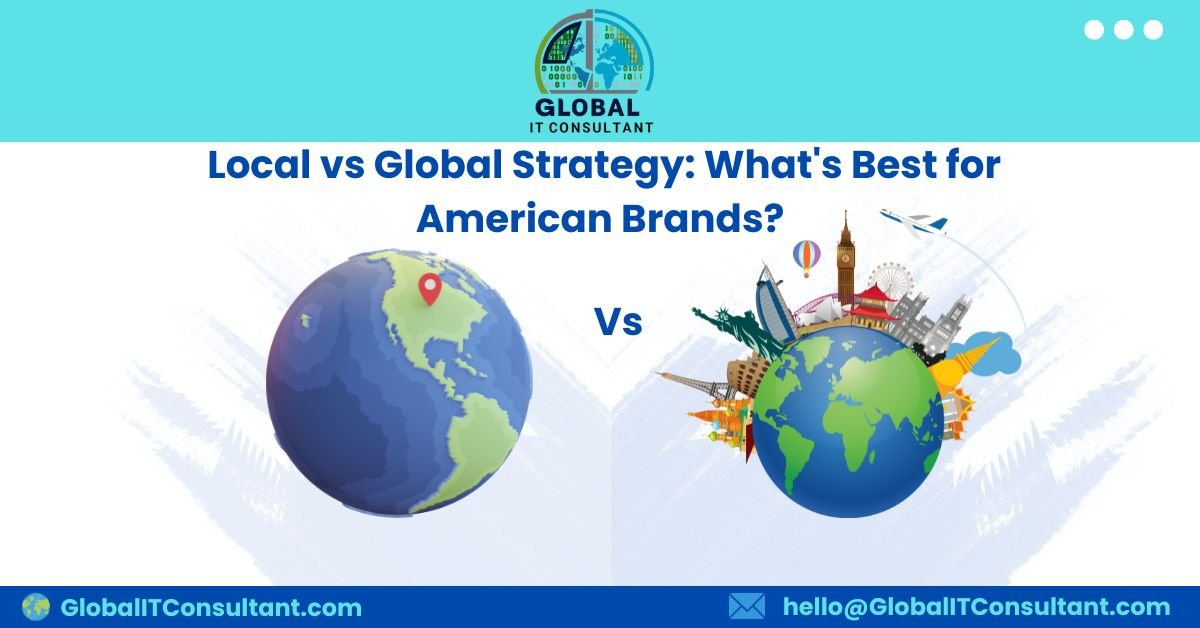By Global IT Consultant
For American brands eyeing growth in 2025, the big question isn’t whether to expand—but how: should your strategy stay local and deeply focused on the U.S. market, or go global to capture new audiences?
At Global IT Consultant, we’ve helped U.S. startups, SMEs, and established enterprises think through this critical choice. This blog explores the pros, cons, and real considerations behind local vs global strategies—and why the best answer often lies in a balanced, data-driven approach.
🌎 What We Mean by Local vs Global Strategy
Local Strategy:
- Focuses on dominating your domestic (U.S.) market
- Tailors messaging, products, and operations to U.S. consumer preferences, regulations, and culture
Global Strategy:
- Expands reach to international markets
- May adapt offerings to local cultures (multidomestic) or keep products standardized worldwide (global standardization)
✅ Why a Local Strategy Can Win
1. Deep Market Understanding
American consumers often demand fast service, clear messaging, and shared cultural references. A local-first approach can help brands:
- Create hyper-relevant campaigns
- Respond quickly to U.S. market trends
- Adapt to state-level regulations (e.g., California’s CCPA)
2. Lower Operational Complexity
Sticking to one market simplifies:
- Logistics and distribution
- Compliance and tax structures
- Customer service and returns
This reduces overhead—especially valuable for SMEs or new brands.
3. Stronger Brand Loyalty
Consumers increasingly support brands that “feel local,” care about U.S. communities, and align with national values like sustainability or fair labor.
🌍 Why Global Strategy Is Attractive
1. Larger Revenue Potential
Expanding beyond the U.S. market means access to billions of consumers. For digital-first brands, global scaling can be faster and cheaper than adding more physical stores domestically.
2. Diversification
If demand in one region drops, revenue from other regions can stabilize the business.
3. Innovation & Collaboration
Operating globally exposes teams to new ideas, suppliers, and technologies.
⚖️ Key Considerations Before Choosing
| Factor | Local Strategy | Global Strategy |
|---|---|---|
| Market complexity | Lower | Higher (language, culture, regulations) |
| Costs | Lower | Higher (localization, logistics) |
| Speed | Faster domestic rollout | Slower due to research & adaptation |
| Revenue potential | Limited to U.S. | Expanded markets |
| Brand positioning | Strong domestic brand identity | Broader but must manage consistency |
🧩 Many American Brands Use a Hybrid Approach
Rather than choosing strictly local or global, successful brands often:
- Start local to build strength and refine products
- Expand internationally with tailored strategies
- Keep core brand values consistent worldwide, while adapting messaging
Example:
- U.S. fashion brands standardize design globally but tailor campaigns to local tastes
- Tech firms offer the same SaaS product but localize payment systems and customer support
🏢 Case Insight: Mid-Sized U.S. Manufacturer
A Midwest-based manufacturer worked with Global IT Consultant to:
- Strengthen its domestic digital presence first (SEO, B2B e-commerce)
- Then explore Canada and Western Europe with targeted digital campaigns and local partnerships
Result: New international revenue stream while maintaining core U.S. customer base.
📊 How to Decide: Key Questions
- Where do your ideal customers live?
- Can your operations handle international complexity?
- Are there cultural or legal barriers to entry?
- Will global expansion dilute your domestic brand strength?
- How quickly do you need ROI?
✅ Final Thoughts
The choice isn’t only local vs global—it’s about sequencing, strategy, and scale.
For many American brands, starting local and expanding strategically abroad delivers both stability and growth.
At Global IT Consultant, we help U.S. businesses analyze data, model scenarios, and build expansion strategies tailored to their vision.
👉 Thinking global? Start with a local plan that scales.
Contact us to explore your strategy.

